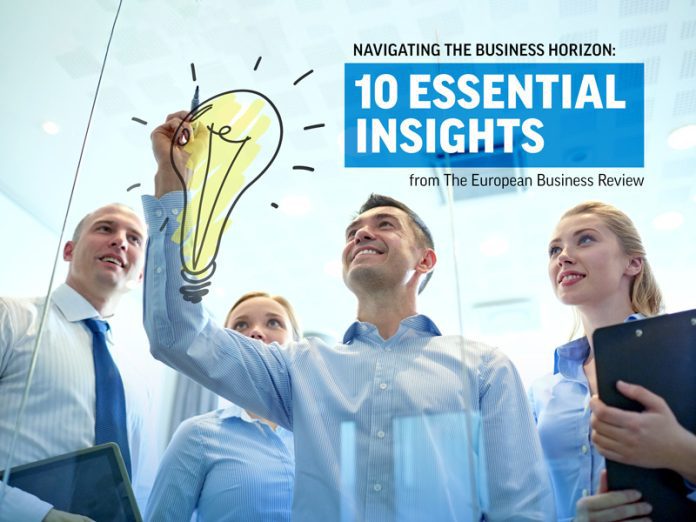“In this moment, we must all be learners – figuring out not how to simply make the best of it, but how to make it the best it can be.” – Ian Johnston, Partner in Heidrick & Struggles
Finding the right path to success can be like navigating through a complex maze.
As we venture into a new era of business, we face challenges and opportunities that call for adaptable insights and transformative knowledge. Businesses are continually reshaping their foundations, seeking innovative solutions for sustainability, nurturing leadership and innovation, adapting education, fostering collaborative ecosystems, and fine-tuning global strategies. It’s a landscape in constant flux, and adaptation is the key to thriving.
The European Business Review, as a trusted source of business wisdom, has been your companion on this journey. We’ve combed through our archives to bring you these articles that hold the power to reshape the way you approach business. This collection is designed to inspire you to adapt your strategies, engage in more meaningful conversations, and ultimately foster the growth of your organisation. Whether you’re seeking help executing strategy, change leadership, effective communication, or another business topic, our collections bundle key resources together to help you excel.
If you read nothing else to guide your journey through the dynamic business terrain, read these ten essential insights.
1. Redefining Business Foundations
Rajnish Sinha, CPO at outsourcing provider TaskUs, discusses the importance of prioritising employee well-being when a company outsources its operations. Sinha emphasises the significance of the working environment and employment policies of the outsourcing provider in ensuring a positive experience for employees. TaskUs has successfully built a culture that focuses on people-first values and has received recognition for being an excellent company for diversity and women. Sinha recommends that companies looking to be more inclusive should not just talk the talk but also walk the walk, creating a safe and equitable environment for all employees.
Christoph Grainger-Herr, CEO of IWC Schaffhausen, talks about the opening of the new IWC Manufacturing Center, which combines traditional craftsmanship with advanced technology to create high-quality timepieces. Grainger-Herr’s background in architecture influenced the design of the manufacturing center, emphasising optimal working conditions for employees and a unique experience for visitors. He highlights the importance of being a socially responsible company focusing on sustainability and transparency. Grainger-Herr also shares IWC’s commitment to the traceability of watch components and its efforts to reduce environmental impact.
Engaging the audience with the transformative dynamics of modern business foundations
Sinha and Grainger-Herr illustrate the evolving landscape of modern business foundations. “Outsourcing That Puts People First” emphasises the shift towards prioritising employee well-being in outsourcing, showcasing the need for companies to maintain a positive working environment even when operations are outsourced. “Craftsmanship Meets Technology” demonstrates how traditional craftsmanship and cutting-edge technology can coexist to create high-quality products while focusing on sustainability and transparency. They both highlight the importance of adaptability, social responsibility, and innovation in the ever-changing world of business, inviting the audience to consider the transformative dynamics that shape the future of businesses in various industries.
2. Sustainability in Action
In our interview with Meiny Prins, CEO of Priva, the focus is on the flaws in current food production and distribution systems and the need for sustainable solutions. Ms. Prins emphasises the importance of optimism, collaboration, and setting the right priorities to address these issues. She highlights the chaotic agricultural and food distribution system as a significant problem, leading to malnutrition, hunger, and environmental damage. Priva’s solutions involve climate controls, data-controlled systems, and technology-driven approaches to make food production more efficient and environmentally friendly. Ms. Prins discusses the urgent need for policy changes at the federal level to tackle food security and hunger, as well as the importance of moving food production back to cities.
Examining sustainable solutions and their tangible impact on businesses
The interview underscores the significance of adopting sustainable solutions in the food industry. Priva’s commitment to addressing food system chaos through technology-driven innovations highlights how businesses can play a crucial role in solving complex global challenges. It also emphasises that sustainable solutions go beyond environmental benefits. They can lead to economic growth, job creation, and improved community well-being. Bringing food production back to cities can revitalise neighbourhoods, create job opportunities, and improve access to fresh, healthy food. This approach aligns with Priva’s vision of creating sustainable urban deltas, which serve as models for self-sustaining cities. The interview underscores that sustainability is not just a moral imperative but also a strategic choice that can lead to business success and make a tangible impact on society and the environment.
3. Leadership and Innovation
In our interview with Dr. Prem Shamdasani of NUS Business School, he discusses the NUS Business School’s Executive MBA program, emphasising its unique features. The program offers a blend of global business knowledge with deep Asian insights, preparing students to lead Asian businesses internationally and helping global companies succeed in Asia. One key differentiator is the immersive learning experience across seven APAC countries. This experience equips participants with first-hand perspectives into various cultural, business, and political landscapes in the Asia-Pacific region, enhancing their understanding of business operations in these countries. Dr. Shamdasani also highlights the importance of diversity among program participants, which enriches the learning experience by exchanging diverse perspectives and experiences.
Ian Johnston, Partner at Heidrick & Struggles discusses the importance of company culture for business success. He explains that culture is the set of unspoken assumptions that shape the everyday experience of people connected to an organisation, both inside and out. Good company culture involves having every person informed and guided by shared values and goals. The article also highlights that leaders need to intentionally build the culture they want since culture has a direct impact on financial performance. The concept of “culture accelerators” is introduced, indicating that CEOs who prioritise culture, embed it in their strategy, and establish a robust delivery process see significant financial growth. The article emphasises the need for leaders to challenge old models and assumptions, promote inclusivity, and communicate transparently in today’s evolving work environment.
Delving into leadership, innovation, and the cultural underpinnings of business success
To delve into leadership, innovation, and the cultural underpinnings of business success, it’s essential to recognise the significance of leadership and culture in shaping organisations. Good leadership, as seen in the NUS Business School article, involves providing thought leadership, frameworks, and tools, as well as facilitating immersive learning experiences that enhance an individual’s ability to lead both global and Asian organisations effectively. At the same time, Ian Johnston highlights that leaders must intentionally shape their organisation’s culture to align with their strategic goals. Effective leadership involves embedding culture in the strategy and creating a robust delivery process. This culture-focused approach can significantly impact financial performance.
In the post-pandemic world, adapting to new work models, such as hybrid and remote work, is crucial. Leaders must prioritise inclusion, communication, career development, productivity, and innovation in this evolving work environment. Inclusive leadership, fostering collaboration, and ensuring the workforce feels engaged and connected are key attributes for success. The integration of strong leadership, strategic culture building, and adaptability to the changing work landscape are critical factors for organisational success in today’s business world.
4. Educational Transformation
ESMT Berlin highlights the innovative program structure that combines flexibility with an integrated approach to business challenges. Their online MBA stands out by allowing students to apply their learning to real-time business challenges. The curriculum emphasises continuous development and is constantly updated to include the latest research. Moreover, the program focuses on building virtual communication and leadership skills, essential in today’s work environment. ESMT’s commitment to diversity and accessibility ensures a broad and international learning environment, benefitting students from all over the world.
This article features Antwerp Management School and its approach to executive education. The school’s teaching philosophy centres around the motto “Opening Minds to Impact the World.” The program emphasises personal development and self-awareness, preparing executives to function effectively in a complex business world. The EMBA program at Antwerp Management School is recognised for its transformative impact on participants, helping them become global leaders. It also incorporates ESG-related topics into the curriculum and encourages participants to work on Positive Impact Projects, fostering a sense of responsibility and sustainability.
Showcasing the changing landscape of global education and its pivotal role in shaping leaders
Both ESMT Berlin and Antwerp Management School highlight how top-tier business schools are adapting to the evolving landscape of global education and executive leadership. They demonstrate innovative approaches to online and executive education, focusing on flexibility, diversity, and holistic personal development. These approaches reflect the changing needs of leaders in the post-COVID environment, where adaptability and a broader understanding of global challenges are crucial. As the global business landscape shifts, these institutions play a pivotal role in shaping future leaders who can make a positive impact on the world.
5. Collaborative Ecosystems
De Meyer and Williamson emphasise the increasing importance of companies joining established or emerging business ecosystems to navigate industry disruption, uncertainty, and customer demands for complex solutions. The central question discussed is how companies can succeed as profitable ecosystem partners without leaving the ecosystem. Selecting a promising ecosystem should be guided by the credibility and commitment of the ecosystem leader and its alignment with your strategic goals and capabilities, and partner success in ecosystems is tied to making a unique, valuable, rare, non-substitutable, and hard-to-imitate contribution.
Our interview with Giuseppe Zagami, President of Mind The Value, highlights the company’s approach to management, operations, decision-making, and business integration consultancy services. Mr. Zagami highlights the significance of inspiration, prioritisation, and flexibility in his daily routine. The article traces the evolution of Mind The Value from its inception during a financial crisis to its growth and international expansion, with recognition from the Financial Times.
Focusing on the Essence of Collaborative Ecosystems and Strategic Partnerships
Collaborative ecosystems and strategic partnerships are pivotal in today’s business landscape. De Meyer, Williamson, and Zagami reveal key principles for thriving as an ecosystem partner, ensuring unique contributions, shaping interactions, learning from ecosystems, and managing growth. Collaborative ecosystems provide companies with the potential for innovation, synergy, and competitiveness in a rapidly changing world. Understanding the dynamics of these ecosystems and how to leverage them effectively is essential for sustained success in the modern business environment.
6. Global Business Strategies
The article explores the opportunities and challenges for large corporations collaborating with startups in emerging markets. It highlights Mingke Luo, CEO of MrS.ai, who successfully partnered with BMW to develop AI-driven virtual agents. Prof. Shameen emphasises the importance of adapting startup partnering practices to emerging markets, adopting ideas from startups both locally and globally, and aggregating startup partnerships across various regions. The article underscores the untapped potential in emerging markets and the need for multinationals to engage with startups to address business and societal challenges.
Analysing Strategies for Effective Corporate-Startup Partnerships in Emerging Markets
The article provides valuable insights into strategies for successful corporate startup collaborations in emerging markets. Multinational corporations should be flexible and adaptable in their approach to startup partnerships in emerging markets. Recognising the differing levels of startup ecosystem maturity, providing more support and handholding when necessary, and extending partnership durations can be crucial in helping startups thrive. To harness the innovative capacity of startups effectively, corporations must strike a balance between local and global applications. They shouldn’t only implement innovations in the specific emerging market but also explore how these innovations can be applied in other markets, creating a win-win scenario.
And as emerging markets evolve, corporations should explore new frontiers, including African regions. The African continent holds untapped potential for innovation and sustainability-related partnerships, aligning with global challenges and sustainable development goals. In sum, effective corporate partnerships in emerging markets require a customised approach that balances global and local dynamics, fosters leadership commitment, and strategically aggregates partnerships.
Conclusion
The significance of these insights cannot be overstated. These 10 insights from The European Business Review are the keys to unlocking business excellence in a world where adaptability and innovation are paramount. As we embrace these invaluable insights, we embrace a brighter and more prosperous business future. They are a testament to the boundless potential for growth and innovation. In the spirit of shared knowledge, these insights encourage us to explore beyond our traditional boundaries and harness the wealth of innovative ideas across the globe. Pursuing knowledge and the spirit of innovation are timeless companions for business growth.
As global business dynamics continuously redefine the rules of commerce, these articles offer the wisdom needed to navigate this ever-evolving landscape.
About the Author
Pamela Martinez is a writer for The European Business Review. She is dedicated to crafting timely blog pieces about business acumen, changing leadership dynamics, emerging finance and technology trends, global breakthroughs and how these spaces intersect from a millennial’s perspective. She also works as an editor and content strategist and the sister publications of The European Business Review.





































